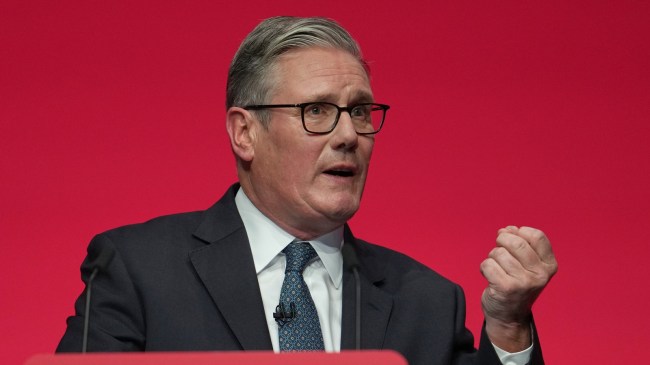Opinion Keir Starmer comes to India: An uptick in Delhi-London cooperation
We must do all it takes to insulate the India-UK partnership from the continuous efforts of vested interests to derail it. Both governments must keep their sights on the swift achievement of shared goals for their people and the world
 Britain's Prime Minister Keir Starmer. (AP Photo)
Britain's Prime Minister Keir Starmer. (AP Photo) British Prime Minister Keir Starmer will make his first official visit to India on October 8-9 at the invitation of Prime Minister Narendra Modi. The visit reciprocates Modi’s July 2025 visit to London, which, inter alia, saw the signing of the landmark Comprehensive Economic and Trade Agreement (CETA).
Starmer’s visit marks an optimistic uptick in India-UK economic cooperation at a time when global geopolitics and trade face unprecedented disruptions and uncertainty. From unilateral sanctions and punitive tariffs to intersecting alliances and “multi-alignments” necessitated by continuously evolving security concerns, every factor of our interconnected world seems to be forced towards a “reboot”.
As the Ukraine war ravages the financial planning of governments across Europe, the UK, too, has felt a significant impact. Higher energy costs have affected daily life and industrial productivity. High expenditure on support for Ukraine — the UK has committed up to £21.8 billion — has necessitated a recasting of its domestic expenditure outlay, even as it copes with the fallout of Brexit and Covid.
For both India and the UK, the challenging international scenario has been a reminder of their complementary strengths. These are reflected in the India-UK Comprehensive Strategic Partnership — Vision 2035, a 10-year roadmap for initiatives in trade, investment flows in both directions, better market access, fintech and financial linkages, collaboration in innovation and advanced technology, education, health, defence and security, people-to-people relations as well as global issues such as climate change, sustainable development and energy security (both are co-founders of the One Sun One World One Grid Initiative and the UK was the first co-chair of the Governing Council of India’s Coalition for Disaster Resilient Infrastructure initiative).
The India-UK relationship is highlighted in the UK’s 2023 policy paper, “Integrated Review: Responding to a more contested and volatile world” (IR 2023). It talks about building on the comprehensive partnership, implementing the India-UK 2030 roadmap, strengthening the defence and security partnership with India, increasing collaboration on technology and “leading the maritime security pillar of India’s Indo-Pacific Oceans Initiative”. The paper emphasises UN Security Council reform, welcoming India as a permanent member in particular — a stance Starmer has recently reiterated. Starmer’s government, while carrying forward IR 2023, commissioned a Strategic Defence Review in 2025, which specifically acknowledges India as a partner in global security.
London and Mumbai being financial hubs, it is fitting that the two prime ministers will address the sixth Global Fintech Fest and engage with stakeholders for the success of the CETA, designed to boost bilateral trade by £25.5 billion annually and take it to a total of £90 billion ($120 billion) by 2030. This would be hugely beneficial to key sectors in India such as textiles, footwear, sports goods, toys, marine products, gems and jewellery, engineering goods, auto parts and engines and organic chemicals – bringing relief amid US tariff hikes and with the EU’s Carbon Border Adjustment Mechanism looming on the horizon.
In Mumbai, the two leaders will review progress on the India-UK Vision 2035 initiatives they endorsed in July. So far, progress in the different tracks has been encouraging but could be better. For example, full operationalisation of the India-UK Migration and Mobility Partnership Agreement signed in May 2021 — which has seen patchy implementation so far — will enable smoother movement of professionals between the two countries, streamline visa procedures for diplomats, officials, transit passengers and other categories and, hopefully, hasten extraditions.
Bilateral defence consultations and air-, sea- and land-based joint exercises, as well as institutionalised defence dialogue mechanisms, are ongoing. On the eve of Starmer’s visit, The Konkan bilateral naval exercise began in the western Indian Ocean, with the deployment of aircraft carriers, warships, submarines and fighters for complex combat manoeuvres. Transforming defence ties towards a qualitatively new level — of co-development and co-production — would be a win-win for both India and the UK, and for the countries that we would export to. Greater sensitivity to each other’s security concerns and concrete action in addressing them, and closer cooperation in cybersecurity and real-time intelligence sharing, would greatly enhance mutual trust and hold value for both sides.
A valuable element in the India-UK relationship is the Indian diaspora, a well-integrated component of the British economy. British Indians are counted among the top contributors to British productivity and competitiveness. They own 65,000 companies in the UK and have the highest average earnings and highest employment levels (75 per cent). They are valued in every sector — business, industry, academia and science, politics, literature and the arts.
Our governments and parliaments have recognised the true potential of closer cooperation across the board, with a shared commitment to common values. In both our free and pluralistic societies, there are bound to be elements that remain intent on promoting a narrative that would hinder the realisation of “Vision 2035”. We must do all it takes to insulate the India-UK partnership from the continuous efforts of vested interests to derail it. Both governments must keep their sights on the swift achievement of shared goals for their people and the world.
The writer is former high commissioner of India to the United Kingdom





